Please briefly introduce yourself and what led you to the Resolution Project
I am Dr. Prince Makawa Abudu, an Applied Scientist at Amazon and PhD/DPhil graduate in Computer Science from the University of Oxford, UK. In 2016, I was selected as one of two Zimbabweans to win the prestigious Rhodes Scholarship to study at Oxford. For my PhD research, I was within the Sensor Networks and Indoor Positioning Group. My research focused on optimizing Machine Learning algorithms, i.e., Recurrent Neural Networks for distributed communication in IoT applications. Prior to Oxford, graduated summa cum laude with a Bachelor of Science degree in Computer Science and as the highest-ranking scholar in the Department of Computer Science at Morehouse College, in Atlanta, Georgia, USA. I am a highly motivated youth leader who has an amazing commitment to excellence, along with firm determination to serve for a greater good. Owing to my passion to serve and bring impact in my own way, I co-founded Emergination Africa (www.emerginationafrica.org), an intercontinental youth-driven educational organization. I currently serve as the Director of Operations at Emergination Africa. In 2014, owing to my social venture’s success, I was selected to be a Resolution Project Fellow at the Clinton Global Initiative University in Arizona, USA. In 2018, I joined the Harambe Entrepreneur Alliance as an associate, being selected to represent less than 2% of young African entrepreneurs who applied to the alliance.
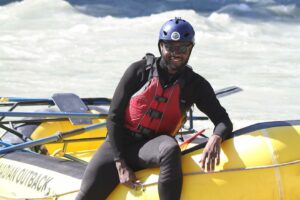
Please briefly introduce your venture
Emergination Africa is all about developing Africa’s future human capital through early talent identification and nurturing. We envision an Africa where all young people are equipped to create opportunities for themselves and others. Our virtues are to solve hard problems, be agile, diverse and purpose driven, while at it.
Our purpose at Emergination Africa is to advance Africa’s prosperity. We achieve this by curating real-world bespoke career readiness curriculums, teacher trainings, competitions and virtual classrooms designed for secondary school learners to realize their path along the education to employment and employment creation highway. We fundamentally believe that education and work in Sub-Saharan Africa will determine the livelihoods of nearly a billion people across the continent making the African human capital opportunity a massive undertaking that will define the 21st century.
We currently have 3 core programs:
- Teacher Professional Development: Our Teacher Professional Development Program is in line with the United Nations SDG indicator 4.c.1 of increasing the supply of qualified teachers. The program upskills African Secondary School principals (heads) and teachers to imbue a 21st-century education mindset and culture across their institutions that can identify and nurture young African talent.
- Venture Development Competitions: In line with the United Nations SDG indicator 4.4 of substantially increasing the number of youth and adults who have relevant skills, including technical and vocational skills, for employment, decent jobs and entrepreneurship. Our venture development competitions strive to gamify project-based learning and bring real-world practical learning in secondary schools through incentivized competition. Importantly, our competitions catalyze learners, companies, and global organizations across different disciplines to participate in the development of innovative ideas that help solve grand challenges that restrict Africas prosperity.
- Global Competency Accelerator: In line with the United Nations SDG indicator 4.4 of substantially increasing the number of youth and adults who have relevant skills, including technical and vocational skills, for employment, decent jobs, and entrepreneurship. Our global competency accelerator (GCA) can be implemented as a 2-week program during school holidays or during a single school term. Led by local and global coaches that are teachers and industry professionals, the program coaches drive dialogue on global careers, career trajectories, skill development, life planning and self-management giving learners the tools, techniques, network and tool kit required to get their first job or university acceptance.
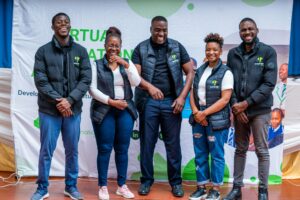
Where are you currently finding inspiration and joy?
I currently find inspiration and joy from three places:
- Belief in a higher purpose: Constantly believing that my purpose on this earth extends beyond just me and the people I interact with everyday motivates me to look forward to each day. I believe that if my positive impact can extend beyond my current circumstances, realities and environment, then I can say that I have led a fulfilling life.
- Taking time to enjoy the things I love: As a highly driven individual, it is often the case that I can forget to take a break and breathe. Lately, I have been finding that blocking off a day to go hiking, white-water rafting, camping, river tubing, or any outdoor activity brings me so much calm, peace and joy.
- The people I love: Finding time to connect with family and friends always inspires me to want the best for myself, so that in turn I can also make their lives easier in any ways I can. I find so much inspiration in being the best version of myself for them, because if I can do that for them, then I can contribute more meaningfully to the world at large. As the famous writer says, “Charity begins at home!”.
What role do young leaders play in the world today?
I believe that young leaders can play a significant role in the world today. Young people are strategically positioned at the intersection of revolutionary trends, i.e., technological advancements, major geopolitical developments, health crises etc. Living in the world where we are challenged by trends as such inherently nurtures the need to be innovative, not reactive. In doing so, we can merge these realities, with state-of-the-art education, technologies and new ways of thinking to challenge the status quo and be the change we want to see. Young leaders of this generation have been exposed to a wide variety of tools and support systems that enable learning, collaboration and iteration in much faster ways than have ever been possible. Consequently, we have naturally evolved into a problem solving generation, whose skills when harnessed can bring about immense benefit to humankind.
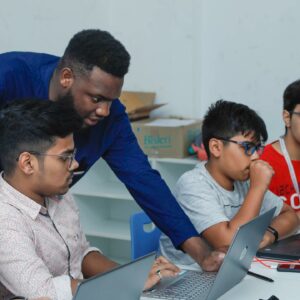
What inspired you to start your social entrepreneurship journey?
I was fortunate enough to attend Kutama College as my high school in Zimbabwe. Kutama College is renowned for its reputation in raising students who are academically gifted (the late President of Zimbabwe, Robert Mugabe attended the same school). Whilst at Kutama College, I was invited to apply for a scholarship that would sponsor my studies at an American university after high school. 500 students across Zimbabwe competed for the same scholarship, but only 10 had to be selected. I was competing with some students who had completed their Advanced level with over 30 points (6 A’s). To put this into perspective, normally, Advanced level students study 3 subjects and if one is passing with flying colors, then they would have 3 A grades (15 points). The competition was stiff, but I managed to get shortlisted, although I only had completed Ordinary level (Grade 10) studies. I was shocked to learn that I had outdone students who had better grades than me and also had had more education. Most of my success can be attributed to the fact that I was extremely resourceful and managed to study for the SAT (standardized tests for US universities) in a week and got a great score (1790/2400). I reflected upon this opportunity and realized that many extremely intelligent young Zimbabweans were being passed by opportunities because they did not have relevant skills to be resourceful, identify, nurture and pursue opportunities around them. The education system was not training individuals to compete in the global economy and the curriculum was outdated. This is how I identified a gap in the education of many African countries. Inspired by my own journey, I sought to help other young Africans to create opportunities for themselves and for others. In doing this, we would advance Africa’s transformation through skills training, early talent identification and nurturing. And that was the birth of Emergination Africa.
What excites you most about the Resolution Fellowship?
I recall the early days of Emergination Africa vividly, in the year 2013. My co-founder, Taku Machirori and I would sacrifice our stipends to fund all operations of our venture. I would have to manually match mentors and mentees on my university laptop using a spreadsheet and use a better chunk of my free time ensuring that our programs ran smoothly. When we learned about the Clinton Global Initiative University and how Resolution Project would select social entrepreneurs to attend and pitch their programs for funding, access to meteors and a network of like-minded changemakers, we were ecstatic. Attending CGI U in 2014 and winning a spot as Resolution Fellows with our venture became a launchpad for us. It was the validation we needed that our project idea would create the impact we intended. Funding from Resolution Project increased our operational capacity as we were able to onboard more schools to our programs and even hire part-time staff. Resolution Project gave us access to project mentors who became the motivation and sounding board for our innovative ideas. Years later, we used stories of how Resolution Project believed in us to get more support from other organizations who saw potential in us and believed in the impact Emergination Africa would bring to young Africans. Through Resolution Project’s support and tremendous support from George Tsiatis (CEO & Co-founder of Resolution Project), who wrote me a letter of recommendation to win the Rhodes Scholarship and attend the University of Oxford, I have been able to achieve the academic and professional goals I have set for myself and goals I set for my venture, Emergination Africa.
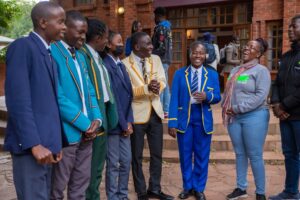
What advice would you give to other young leaders who are looking to start their first social venture?
The advice I would give to other young leaders is “strive to do what is right, not what it easy” I have always sought to implement this advice for myself, especially with my work at Emergination Africa, there are many times when we could have taken short-cuts or worked with people that do not necessarily believe in our vision, mission and values. Guided by this, I have sought to influence my team to always ask, “Is this the right thing to do” for our learners, teachers, beneficiaries before anything. This helps us to stay focussed on serving and achieve the impact we want. I apply this advice for myself as well, and as you can probably guess, the results are worth it! Moreover, you will face difficulties and hardships, common ones are, lack of funding, lack of support from colleagues, your community and society etc., but keep your head up continue to believe in your conviction and the impact you seek to bring to the world, someone somewhere will see the fire in you and invest in your vision, support your goals and walk your journey with you.
Can you tell us how your venture has directly impacted those whom you aim to serve? How has Resolution contributed to this impact?
Emergination Africa has reached over 195 schools, more than 15537 learners with a 55% learner gender parity while working with 200 teachers across all the 10 provinces of Zimbabwe and one province in Kenya in 2022.
Our venture development competitions have seen 8 schools selected from various provinces in Zimbabwe, competing in a Virtual Innovation Accelerator program in 2021. The Virtual Innovation Accelerator offers masterclass sessions in which learners get direct mentorship and assistance from over 30+ top industry leaders in 5+ countries (Germany, USA, UK, Austria, Zimbabwe etc.) to refine their proposed business solutions. Learners received 5000 euros each to implement their business ideas and address business problems in their communities. In doing this, we are directly providing learners with business skills that they can eventually share with their communities and realize economic impact.
Through our Global Competency Accelerator programs, we have seen over 5+ students graduating from university abroad.
Our Teacher Professional Development programs equip teachers with project-based learning, facilitative teaching and business skills required to guide learners through their entrepreneurial journey. By empowering teachers, we give learners the best chance to create opportunities for themselves and their communities.
Owing to the impact we have had, We were recognized by the African Union for our work. The Resolution Project has contributed to this impact by providing a community to learn from and mentors who have helped us sharpen our ideas and programmatic approach. Being an active part of this community enables us to get inspiration and knowledge from other fellows who have started similar ventures.
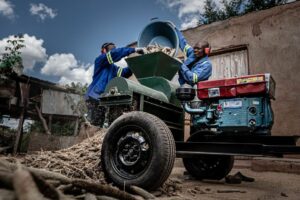
What do you think is preventing more young people like you from launching their own venture?
Young people have many distractions in today’s world and lack the right role models. The fact that one can simply download TikTok, Instagram or Snapchat etc., and access to a wide array of non-educational content has contributed to a generation that does not look beyond the phone screen. This generation misses the opportunity to venture outside of the social media bubble and aspire toward role models who are solving real world challenges to enable them to recognize real issues affecting their communities, and nurture solutions to the issues with some real action. Apart from such distractions, I believe that many young people like me are lacking support, mentorship and in many cases they do not avail themselves for these useful relationships, which can encourage them and motivate them to see real challenges and address them. Starting a venture and sustaining it is entirely challenging because it requires dedication, resources, commitment and grit. Lack of funding does not help in most cases, but young people need to learn to start from what they have and build from that. Unfortunately, most philanthropists want to see some impact to invest in young people, so I would encourage young people to venture out, solve real problems, do so with elegance and grace (using those few resources they have), that the right support they need gravitates towards them.